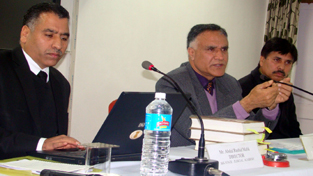Excelsior Correspondent
Jammu, Jan 24: Under the guidance and patronage of Chief Patron of J&K State Judicial Academy, Justice N. Paul Vasanthakumar, Chief Justice, High Court of Jammu and Kashmir and Committee of Judges, State Judicial Academy (Justice Muzaffar Hussain Attar, Chairman and Justice Janak Raj Kotwal, Member), Jammu and Kashmir State Judicial Academy today conducted one day training programme on remedial measures to cut short delays in civil and criminal cases, procedure in complaint cases with special emphasis on complaints under Negotiable Instrument Act and framing of issues for Sub-Judges and Munsiffs of Jammu province.
Justice Muzaffar Hussain Attar, Judge, High Court of Jammu and Kashmir and Chairman, State Judicial Academy inaugurated the training programme.
The proceedings were conducted by Abdul Rashid Malik, Director, J&K State Judicial Academy. He welcomed Justice Muzaffar Hussain Attar, Jaffer Hussain Beigh, District and Sessions Judge and participating officers. He gave an overview of the programme and deliberated on the need for organizing such programmes.
While interacting with Judicial Officers, who highlighted practical difficulties being faced by them, Justice Muzaffar Hussain Attar having varied experience both as a lawyer and Judge of the High Court gave practical instances and suggested remedial measures to cut short delays in civil and criminal cases. He enlightened the participants regarding ways and means which trials judges can adopt to avoid unnecessary adjournments. He cautioned the Judicial Officers that adjournments cannot be granted at the drop of the hat. The court has a sacred duty to see that the trial is conducted as per law. If adjournments are granted without any sufficient cause, it would tantamount to violation of rule of law and eventually turns the trial into a farce. The trial courts are expected in law to follow the command of the procedure relating to trial and are expected not to yield to the request of the counsel to grant adjournment for non-acceptable reasons. He said that a judge should have a perception of a judge from the point of view of society as the society has large expectations from them and their job is to deliver justice on merit and not what the counsel for the parties are expecting.
2nd Session of the progamme was dealt by Jaffer Hussain Beigh, District and Sessions Judge on the topic, “Procedure in complaint cases with special emphasis on complaints under Negotiable Instrument Act.” He cleared confusions and doubts which the participants had about the various legal provisions and procedures.
In the post lunch session, D.C. Raina, Senior Advocate, High Court of Jammu and Kashmir deliberated upon the “Role and Responsibility of Trial Judges to overcome delays in civil and criminal cases, Adjournments, duty of civil courts at the time of examination of parties and framing of Issues”. He masterly dealt with the tools and techniques of case flow management, granting of adjournments, examination of parties, framing of issues and court craft.
The programme was concluded with vote of thanks by the Director, State Judicial Academy.


